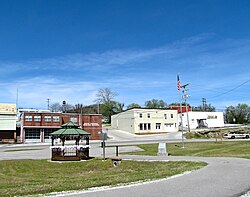South Carthage, Tennessee
South Carthage, Tennessee | |
|---|---|
 Buildings along Old Highway 53 | |
 Location of South Carthage in Smith County, Tennessee. | |
| Coordinates: 36°14′44″N 85°57′29″W / 36.24556°N 85.95806°W | |
| Country | United States |
| State | Tennessee |
| County | Smith |
| Area | |
• Total | 2.64 sq mi (6.84 km2) |
| • Land | 2.56 sq mi (6.64 km2) |
| • Water | 0.08 sq mi (0.20 km2) |
| Elevation | 509 ft (155 m) |
| Population | |
• Total | 1,490 |
| • Density | 581.35/sq mi (224.45/km2) |
| Time zone | UTC-6 (Central (CST)) |
| • Summer (DST) | UTC-5 (CDT) |
| FIPS code | 47-69680[3] |
| GNIS feature ID | 1270836[4] |
South Carthage is a town in Smith County, Tennessee, United States. The population was 1,322 at the 2010 census.[5] The town is located along the Cumberland River opposite Carthage.
Geography
[edit]South Carthage is located at 36°14′44″N 85°57′29″W / 36.24556°N 85.95806°W (36.245584, -85.958043).[6] The town stretches along the south bank of the Cumberland River from Goodall Island eastward to the river's confluence with the Caney Fork (river miles 306-309). South Carthage is traversed by U.S. Route 70N, and the highway's key intersection with State Route 25 and State Route 53 is located within the town's southeastern limits. The town is connected to Carthage via two bridges: the Cordell Hull Bridge on the west, and Veterans Memorial Bridge (which carries SR 25) on the east.
According to the United States Census Bureau, the town has a total area of 2.7 square miles (7.0 km2), of which 2.6 square miles (6.8 km2) is land and 0.077 square miles (0.2 km2), or 2.91%, is water.[5]
Demographics
[edit]| Census | Pop. | Note | %± |
|---|---|---|---|
| 1970 | 859 | — | |
| 1980 | 1,004 | 16.9% | |
| 1990 | 851 | −15.2% | |
| 2000 | 1,302 | 53.0% | |
| 2010 | 1,322 | 1.5% | |
| 2020 | 1,490 | 12.7% | |
| Sources:[7][8][2] | |||
2020 census
[edit]| Race | Number | Percentage |
|---|---|---|
| White (non-Hispanic) | 1,324 | 88.86% |
| Black or African American (non-Hispanic) | 48 | 3.22% |
| Native American | 3 | 0.2% |
| Asian | 14 | 0.94% |
| Other/Mixed | 52 | 3.49% |
| Hispanic or Latino | 49 | 3.29% |
As of the 2020 United States census, there were 1,490 people, 536 households, and 344 families residing in the town.
2000 census
[edit]As of the census[3] of 2000, there were 1,302 people, 554 households, and 366 families residing in the town. The population density was 501.0 inhabitants per square mile (193.4/km2). There were 589 housing units at an average density of 226.6 per square mile (87.5/km2). The racial makeup of the town was 95.31% White, 2.46% African American, 0.08% Native American, 0.23% Asian, 0.54% from other races, and 1.38% from two or more races. Hispanic or Latino of any race were 1.38% of the population.
There were 554 households, out of which 33.0% had children under the age of 18 living with them, 50.2% were married couples living together, 12.8% had a female householder with no husband present, and 33.9% were non-families. 30.9% of all households were made up of individuals, and 16.6% had someone living alone who was 65 years of age or older. The average household size was 2.35 and the average family size was 2.92.
In the town, the population was spread out, with 25.4% under the age of 18, 7.1% from 18 to 24, 29.7% from 25 to 44, 21.4% from 45 to 64, and 16.4% who were 65 years of age or older. The median age was 37 years. For every 100 females, there were 86.0 males. For every 100 females age 18 and over, there were 79.8 males.
The median income for a household in the town was $30,592, and the median income for a family was $35,066. Males had a median income of $31,080 versus $20,577 for females. The per capita income for the town was $14,425. About 10.7% of families and 15.2% of the population were below the poverty line, including 14.6% of those under age 18 and 24.6% of those age 65 or over.
References
[edit]- ^ "ArcGIS REST Services Directory". United States Census Bureau. Retrieved October 15, 2022.
- ^ a b "Census Population API". United States Census Bureau. Retrieved October 15, 2022.
- ^ a b "U.S. Census website". United States Census Bureau. Retrieved January 31, 2008.
- ^ "US Board on Geographic Names". United States Geological Survey. October 25, 2007. Retrieved January 31, 2008.
- ^ a b "Geographic Identifiers: 2010 Demographic Profile Data (DP-1): South Carthage town, Tennessee". U.S. Census Bureau, American Factfinder. Archived from the original on February 10, 2020. Retrieved March 25, 2013.
- ^ "US Gazetteer files: 2010, 2000, and 1990". United States Census Bureau. February 12, 2011. Retrieved April 23, 2011.
- ^ "Census of Population and Housing: Decennial Censuses". United States Census Bureau. Retrieved March 4, 2012.
- ^ "Incorporated Places and Minor Civil Divisions Datasets: Subcounty Resident Population Estimates: April 1, 2010 to July 1, 2012". Population Estimates. U.S. Census Bureau. Archived from the original on June 11, 2013. Retrieved December 11, 2013.
- ^ "Explore Census Data". data.census.gov. Retrieved December 27, 2021.
External links
[edit] Media related to South Carthage, Tennessee at Wikimedia Commons
Media related to South Carthage, Tennessee at Wikimedia Commons- Municipal Technical Advisory Service entry for South Carthage — information on local government, elections, and link to charter


 French
French Deutsch
Deutsch